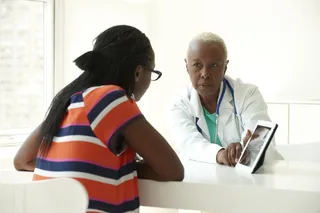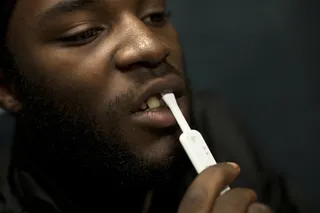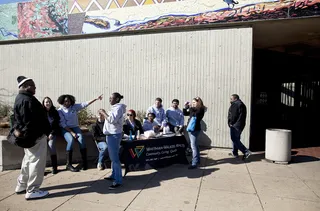June 27 Is National HIV Testing Day
Read more about why we all need to get swabbed.

1 / 15
Have You Been Tested for HIV? - June 27 commemorates National HIV Testing Day! Read more about why we all need to get tested, different modes of testing and what happens if you test positive —Kellee Terrell(Photo: Mario Tama/Getty Images)

2 / 15
Why You Need to Know Your Status - You might say “I don’t want to know” or “My life will be over,” but really your life begins when you get your results, because now you know how to move forward with your health and life. Plus, not knowing means putting your partner(s) at risk and unknowingly infecting them if you are positive and don’t know.(Photo: LWA/Dann Tardif/Getty Images)
Photo By Getty Images/STOCK

3 / 15
Not Enough Folks Are Getting Swabbed - The only way to know for sure if you are HIV-positive is to get tested, but not enough of us do. According to the Centers for Disease Control and Prevention, there are 250,000 Americans who have HIV and just don’t know. National HIV Testing Day aims at trying to encourage more people to get tested. (Photo: Chip Somodevilla/Getty Images)

4 / 15
Why HIV Testing is Important to African-Americans - Given that African-Americans are the racial/ethnic group most affected by the AIDS epidemic in the U.S., it’s crucial for us to know our status. While we make up 14 percent of the overall U.S. population, we account for almost half of all HIV infections that are diagnosed each year. Knowing your status can save your life. (Photo: Brendan Smialowski/Getty Images)
Photo By Brendan Smialowski/Getty Images

5 / 15
That Means Straight Brothas’ Too! - Heterosexual Black men are the fifth largest group impacted by HIV in the U.S., says the CDC. In 2010, 2,700 heterosexual Black men were newly diagnosed with HIV/AIDS. This number does not include the 1,100 Black male IV drug users who were diagnosed with HIV that same year. So yes, you need to get tested too! (Photo: Flint/Corbis)
ADVERTISEMENT

6 / 15
There Are Many Testing Options - Nowadays you have so many options of where you can get tested: Planned Parenthood, your local health clinic, your general practitioner, your OB/GYN, a van outside a club or a health fair. The power is in your hands. Just find the setting that makes you feel most comfortable and get it done! (Photo: Brendan Smialowski/Getty Images)

7 / 15
Testing Doesn’t Have to Be Scary - Fear is a main reason why people don’t get tested, but you don’t have to be afraid and you don’t have to go alone. Bring a friend along with you for moral support!(Photo: Getty Images)

8 / 15
Who Should Get Tested? - Regardless of sexual orientation, anyone who is having sex — especially if you are having unprotected sex and/or are an IV drug user — should get tested! The CDC recommends that folk ages 13-64 should be routinely tested, which means HIV should be treated like other ailments such as cholesterol levels, heart disease and diabetes. Yet, routine testing is rarely enforced. (Photo: Brendan Smialowski/Getty Images)
Photo By Photo: Brendan Smialowski/Getty Images

9 / 15
Speak Up for Yourself - If you decide to use your primary care doctor or gynecologist please know that just because they may take your blood DOES NOT mean you are being tested for HIV. Ask for an HIV test and whatever you do, DO NOT let them talk you out of it. You deserve to know your status, regardless if your doctor thinks you are not at risk for HIV. (Photo: China Photos/Getty Images)

10 / 15
Why Late Testing Is Bad for Blacks - African-Americans are more likely to be diagnosed with HIV and AIDS at the same time than any other racial group. Late testing is not only dangerous for the person living with HIV/AIDS, but for the entire community because people who are not on AIDS medications are more likely to unknowingly transmit the virus to their partners if they have unprotected sex. (Photo: Brendan Smialowski/Getty Images)
ADVERTISEMENT

11 / 15
Why Don’t People Get Tested? - Cultural stigma and lack of health care benefits may stand in the way of people getting tested. But so does the fact that HIV is treated differently than other diseases such as diabetes and heart disease. Depending on where you live, there may be required consent forms or pre-testing conversations, which may deter people from going through with it. This can be a missed opportunity to test someone who may be positive and doesn’t know it. (Photo: Spencer Platt/Getty Images)

12 / 15
Types of HIV Tests - Nowadays, there are more options in HIV testing. You can get a rapid test, which is when they swab your mouth or take blood from your finger. Your results are ready in 30-60 minutes. You can also get a Western blot test, where they take your blood in a doctor’s office. Those results take longer than rapid testing. Plus, there is the at-home HIV testing kit. (Photo: John Moore/Getty Images)

13 / 15
Getting Tested Once Isn’t Enough - OK, so you got tested and it came back negative. That’s good, but that one negative result doesn’t mean you are done with HIV testing for good. Maintaining a HIV negative status means taking all of the precautions and getting tested between every 6 months to a year to keep on top of your status. (Photo: Kevork Djansezian/Getty Images)

14 / 15
What Happens If I Test Positive? - The reality is that some of you will test positive. The first step is getting a confirmation test to make sure your test wasn’t a false-positive. If that comes back positive, please know your life IS NOT over. It actually has just begun because now you know your status and can make the proper plans for your future in terms of medication and support. Learn more about being newly diagnosed with HIV at TheBody.Com. (Photo: Alex Wong/Getty Images)
